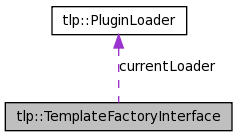| ||||||||||||||||||||||||||||||||||||||||||||||||||||||||||||||||||||||||||||||||||||||||||||||||||||||
tlp::TemplateFactoryInterface Class Reference
|
| virtual tlp::TemplateFactoryInterface::~TemplateFactoryInterface | ( | ) | [inline, virtual] |
Member Function Documentation
| static void tlp::TemplateFactoryInterface::addFactory | ( | TemplateFactoryInterface * | factory, | |
| const std::string & | name | |||
| ) | [inline, static] |
Adds a factory to a static map of factories. This map is then used to list all the factories, and all the plug-ins for each factory.
- Parameters:
-
factory The factory to add. name The name of the factory to add, used as key.
- Returns:
- void
| virtual Iterator<std::string>* tlp::TemplateFactoryInterface::availablePlugins | ( | ) | [pure virtual] |
Gets the list of plug-ins that registered themselves in this factory.
- Returns:
- :Iterator< std::string >* An iterator over the names of the plug-ins registered in this factory.
Implemented in tlp::TemplateFactory< ObjectFactory, ObjectType, Context >, tlp::TemplateFactory< PropertyFactory< PropertyAlgorithm >, PropertyAlgorithm, PropertyContext >, tlp::TemplateFactory< ExportModuleFactory, ExportModule, AlgorithmContext >, tlp::TemplateFactory< PropertyFactory< TPROPERTY >, TPROPERTY, PropertyContext >, tlp::TemplateFactory< ImportModuleFactory, ImportModule, AlgorithmContext >, tlp::TemplateFactory< PropertyFactory< tlp::BooleanAlgorithm >, tlp::BooleanAlgorithm, PropertyContext >, and tlp::TemplateFactory< AlgorithmFactory, Algorithm, AlgorithmContext >.
| virtual std::list<tlp::Dependency> tlp::TemplateFactoryInterface::getPluginDependencies | ( | std::string | name | ) | [pure virtual] |
Gets the dependencies of a plug-in.
- Parameters:
-
name The name of the plug-in to retrieve the dependencies of.
- Returns:
- :list< tlp::Dependency, std::allocator< tlp::Dependency > > The list of dependencies of the plug-in.
Implemented in tlp::TemplateFactory< ObjectFactory, ObjectType, Context >, tlp::TemplateFactory< PropertyFactory< PropertyAlgorithm >, PropertyAlgorithm, PropertyContext >, tlp::TemplateFactory< ExportModuleFactory, ExportModule, AlgorithmContext >, tlp::TemplateFactory< PropertyFactory< TPROPERTY >, TPROPERTY, PropertyContext >, tlp::TemplateFactory< ImportModuleFactory, ImportModule, AlgorithmContext >, tlp::TemplateFactory< PropertyFactory< tlp::BooleanAlgorithm >, tlp::BooleanAlgorithm, PropertyContext >, and tlp::TemplateFactory< AlgorithmFactory, Algorithm, AlgorithmContext >.
| virtual StructDef tlp::TemplateFactoryInterface::getPluginParameters | ( | std::string | name | ) | [pure virtual] |
Gets the list of parameters for the given plug-in.
- Parameters:
-
name The name of the plug-in to retrieve the parameters of.
- Returns:
- :StructDef The parameters of the plug-in.
Implemented in tlp::TemplateFactory< ObjectFactory, ObjectType, Context >, tlp::TemplateFactory< PropertyFactory< PropertyAlgorithm >, PropertyAlgorithm, PropertyContext >, tlp::TemplateFactory< ExportModuleFactory, ExportModule, AlgorithmContext >, tlp::TemplateFactory< PropertyFactory< TPROPERTY >, TPROPERTY, PropertyContext >, tlp::TemplateFactory< ImportModuleFactory, ImportModule, AlgorithmContext >, tlp::TemplateFactory< PropertyFactory< tlp::BooleanAlgorithm >, tlp::BooleanAlgorithm, PropertyContext >, and tlp::TemplateFactory< AlgorithmFactory, Algorithm, AlgorithmContext >.
| virtual std::string tlp::TemplateFactoryInterface::getPluginRelease | ( | std::string | name | ) | [pure virtual] |
Gets the release number of the given plug-in.
- Parameters:
-
name The name of the plug-in to retrieve the version number of.
- Returns:
- :string The version number, ussually formatted as X[.Y], where X is the major, and Y the minor.
Implemented in tlp::TemplateFactory< ObjectFactory, ObjectType, Context >, tlp::TemplateFactory< PropertyFactory< PropertyAlgorithm >, PropertyAlgorithm, PropertyContext >, tlp::TemplateFactory< ExportModuleFactory, ExportModule, AlgorithmContext >, tlp::TemplateFactory< PropertyFactory< TPROPERTY >, TPROPERTY, PropertyContext >, tlp::TemplateFactory< ImportModuleFactory, ImportModule, AlgorithmContext >, tlp::TemplateFactory< PropertyFactory< tlp::BooleanAlgorithm >, tlp::BooleanAlgorithm, PropertyContext >, and tlp::TemplateFactory< AlgorithmFactory, Algorithm, AlgorithmContext >.
| virtual std::string tlp::TemplateFactoryInterface::getPluginsClassName | ( | ) | [pure virtual] |
Gets the class name for the plug-in's registered class. If the class is in the tlp namespace, the 'tlp::' prefix is removed.
- Returns:
- :string The class name of the plug-in.
Implemented in tlp::TemplateFactory< ObjectFactory, ObjectType, Context >, tlp::TemplateFactory< PropertyFactory< PropertyAlgorithm >, PropertyAlgorithm, PropertyContext >, tlp::TemplateFactory< ExportModuleFactory, ExportModule, AlgorithmContext >, tlp::TemplateFactory< PropertyFactory< TPROPERTY >, TPROPERTY, PropertyContext >, tlp::TemplateFactory< ImportModuleFactory, ImportModule, AlgorithmContext >, tlp::TemplateFactory< PropertyFactory< tlp::BooleanAlgorithm >, tlp::BooleanAlgorithm, PropertyContext >, and tlp::TemplateFactory< AlgorithmFactory, Algorithm, AlgorithmContext >.
| static bool tlp::TemplateFactoryInterface::pluginExists | ( | const std::string & | factoryName, | |
| const std::string & | pluginName | |||
| ) | [inline, static] |
Checks if a plug-in exists in a specific factory. In debug mode, an assert checks the factory is registered in the factory map before accessing it.
- Parameters:
-
factoryName The name of the factory to look into. pluginName The name of the plugin to look for.
- Returns:
- bool Whether the plug-in exists in the specified factory.
| virtual bool tlp::TemplateFactoryInterface::pluginExists | ( | const std::string & | pluginName | ) | [pure virtual] |
Checks if a given name is registered in this factory.
- Parameters:
-
pluginName The name of the plug-in to look for.
- Returns:
- bool Whether there is a plug-in with the given name registered in this factory.
Implemented in tlp::TemplateFactory< ObjectFactory, ObjectType, Context >, tlp::TemplateFactory< PropertyFactory< PropertyAlgorithm >, PropertyAlgorithm, PropertyContext >, tlp::TemplateFactory< ExportModuleFactory, ExportModule, AlgorithmContext >, tlp::TemplateFactory< PropertyFactory< TPROPERTY >, TPROPERTY, PropertyContext >, tlp::TemplateFactory< ImportModuleFactory, ImportModule, AlgorithmContext >, tlp::TemplateFactory< PropertyFactory< tlp::BooleanAlgorithm >, tlp::BooleanAlgorithm, PropertyContext >, and tlp::TemplateFactory< AlgorithmFactory, Algorithm, AlgorithmContext >.
| virtual void tlp::TemplateFactoryInterface::removePlugin | ( | const std::string & | name | ) | [pure virtual] |
Removes a plug-in from this factory. This is usefull when a plug-in has unmet dependencies, or appears more than once.
- Parameters:
-
name The name of the plug-in to remove.
- Returns:
- void
Implemented in tlp::TemplateFactory< ObjectFactory, ObjectType, Context >, tlp::TemplateFactory< PropertyFactory< PropertyAlgorithm >, PropertyAlgorithm, PropertyContext >, tlp::TemplateFactory< ExportModuleFactory, ExportModule, AlgorithmContext >, tlp::TemplateFactory< PropertyFactory< TPROPERTY >, TPROPERTY, PropertyContext >, tlp::TemplateFactory< ImportModuleFactory, ImportModule, AlgorithmContext >, tlp::TemplateFactory< PropertyFactory< tlp::BooleanAlgorithm >, tlp::BooleanAlgorithm, PropertyContext >, and tlp::TemplateFactory< AlgorithmFactory, Algorithm, AlgorithmContext >.
Member Data Documentation
TLP_SCOPE std::map< std::string, TemplateFactoryInterface* >* tlp::TemplateFactoryInterface::allFactories [static] |
TLP_SCOPE PluginLoader* tlp::TemplateFactoryInterface::currentLoader [static] |
| Tulip Software by LaBRI Visualization Team 2001 - 2011 |

